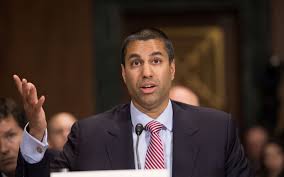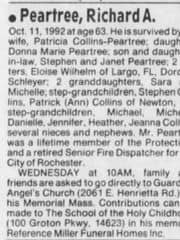
He’s dead. Death notice for Richard Peartree published in the Democrat & Chronicle on Oct. 13, 1992.
Charter Communications’ inability to exercise common sense judgment in helping their customers is demonstrated once again by what we call: The Case of Mrs. Peartree and Her Curious Cable Bill.
Theresa Peartree, a retiree living in Rochester, N.Y., and a customer of “the cable company” under its various names for more than 30 years, has a problem.
Spectrum won’t talk to her. About anything.
Peartree called the cable company to ask why her bill has increased a few dollars a month starting last fall. Spectrum effectively told her it’s none of her business because the account is in the name of her ex-husband, who died in 1992.
Time Warner Cable and Greater Rochester Cablevision — the former names of what today is Spectrum, understood Peartree’s situation and were willing to talk to her about her account, although nobody bothered to suggest she change the name on the account along the way. Spectrum will not talk to her, until she obtains a certified copy of her ex-husband’s death certificate and walk it down to the company’s notoriously overpacked customer service center on Mt. Hope Avenue in the city. Peartree is 89 years old and walks with a cane.
Spectrum’s customer service told Peartree it was easy to get a copy of a death certificate because “they’re a public record.” But most Spectrum customer service representatives are not attorneys or legislators, because if they were, they would have realized the advice they were giving about death certificates in New York was dead wrong.
 So Mrs. Peartree and Spectrum are at an impasse. She took her plight to a local talk radio show and finally to David Andreatta, a feisty and occasionally exasperated columnist for the Rochester Democrat & Chronicle, where he usually covers the insanity of local and state politics.
So Mrs. Peartree and Spectrum are at an impasse. She took her plight to a local talk radio show and finally to David Andreatta, a feisty and occasionally exasperated columnist for the Rochester Democrat & Chronicle, where he usually covers the insanity of local and state politics.
He visited with Peartree and listened in on the legal advice being given by the cable company’s call center employee.
Andreatta knows Spectrum’s claim that death certificates are public records was not quite right:
No, they’re not. In New York, they’re semi-public. If the deceased person has been dead for 50 years, his or her death certificate is public record. If not, only spouses, parents, children or siblings of the deceased are entitled to the death certificate. Exes don’t count.
Others eligible to obtain a death certificate under the law are those with a medical need, a documented lawful claim to receive a benefit or a court order from a state judge.
Peartree has none of those. Her declaration that, “TV is my life,” is a metaphor. Her cable isn’t a “medical need” and her desire to learn why she’s being charged $4 a month more isn’t a “benefit.”
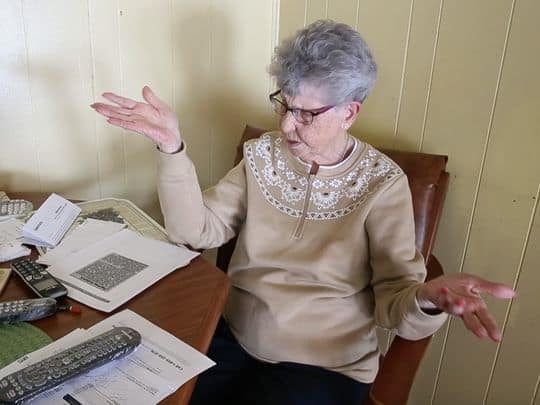
Peartree (Photo courtesy of: Rochester Democrat & Chronicle/Shawn Dowd)
In short, Peartree is trapped by Spectrum. She cannot even close her account because they won’t talk to her. The only chance she has, assuming the public shaming of Spectrum proves ineffective in getting them to budge, is to present herself as a hardship case at the Monroe County Office of Vital Records in hopes of getting them to produce a copy.
But in Monroe County, where the county government prides itself on holding the line on the property taxes (already among the highest in the country) but makes up the difference by charging astronomical fees for almost any county service, that photocopy will cost her $40 — ten times the amount her bill increased last fall.
“They take my money every month,” she told Andreatta, showing him her checkbook with hers being the only name on the account. “They take my money, but they won’t answer my questions.”
“I know they say you can’t believe everything you read in the newspapers, Spectrum, but believe this: Richard is dead and the house you think is his isn’t his,” Andreatta wrote. “It would take a few minutes for your customer service rep to transfer the account in Richard’s name to Peartree’s and tell her why her bill rises $4 a month.”
But so far they won’t. But we can at least answer her question. The additional fees are the result of an increase in Spectrum’s bill padding Broadcast TV Surcharge ripoff and a more recent rate increase on certain cable equipment rental fees.
Andreatta is somehow not surprised:
Ever since Time Warner was rebranded as Spectrum, more readers have asked me to write about their problems with the cable TV and internet provider than any other topic.
I’ve always declined, mostly because their problems were so generic. Their internet was slow. They didn’t want to pay for channels they didn’t watch. That four-hour window for home service.
It was, like, join the club. Cable companies by any name have always been a racket, regularly ranking below airlines, banks and drug makers in opinion polls. What could I do about it?


 Subscribe
Subscribe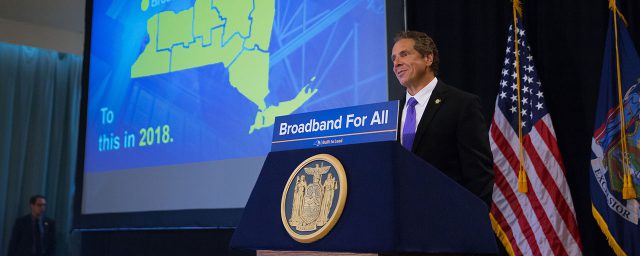
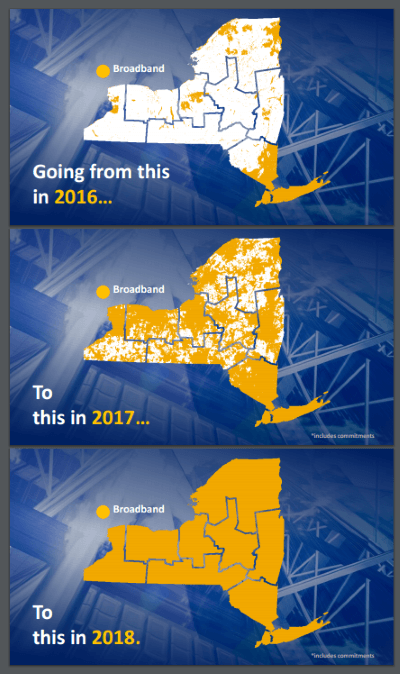

 “This is a huge disappointment for us,” Pat added. “We were counting on this happening. Told numerous times it would. Now we have to debate moving, we can’t continue not having internet. My oldest son just graduated high school never having internet at home.”
“This is a huge disappointment for us,” Pat added. “We were counting on this happening. Told numerous times it would. Now we have to debate moving, we can’t continue not having internet. My oldest son just graduated high school never having internet at home.”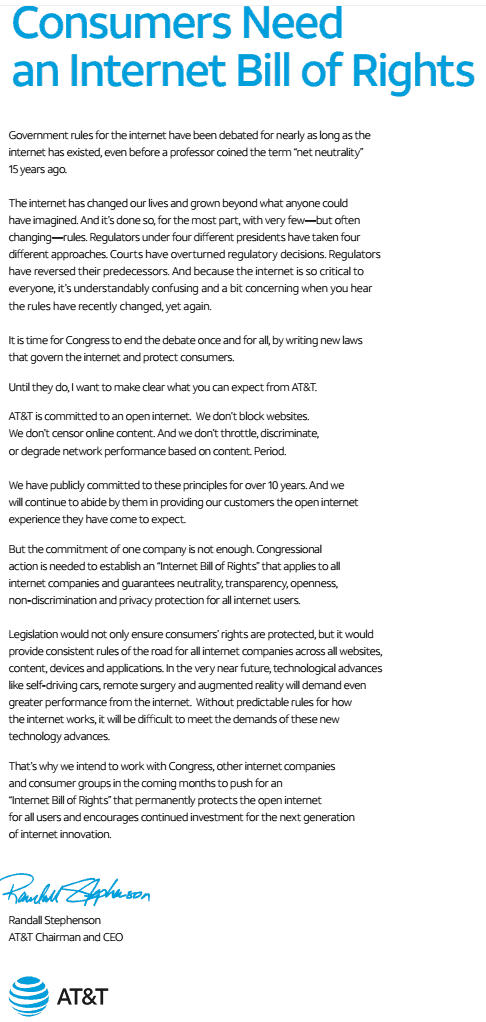


 Blackburn’s bill covers all the bases for the telecom industry she routinely supports.
Blackburn’s bill covers all the bases for the telecom industry she routinely supports. Blackburn’s bill ignores several years of court rulings on net neutrality cases that have called out the flaw of the FCC’s earlier dependence on defining the internet as an “information service” subject to oversight under Section 706 of the 1996 Telecom Act. The courts have ruled this foundation is inadequate to enforce net neutrality. The foundation that has proved adequate and has so-far survived court challenge exists in Title II of the Communications Act, made applicable when the internet was redefined as a common carrier “telecommunications service.” Rep. Blackburn’s bill would return net neutrality enforcement to the same flawed authority courts have already ruled does not apply, neutering net neutrality in the courts.
Blackburn’s bill ignores several years of court rulings on net neutrality cases that have called out the flaw of the FCC’s earlier dependence on defining the internet as an “information service” subject to oversight under Section 706 of the 1996 Telecom Act. The courts have ruled this foundation is inadequate to enforce net neutrality. The foundation that has proved adequate and has so-far survived court challenge exists in Title II of the Communications Act, made applicable when the internet was redefined as a common carrier “telecommunications service.” Rep. Blackburn’s bill would return net neutrality enforcement to the same flawed authority courts have already ruled does not apply, neutering net neutrality in the courts.